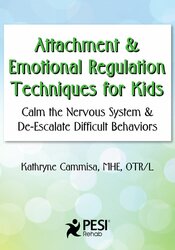

Disorders of sensory processing are common for children with ADHD or autism and can complicate treatment and impact quality of life. Children who have trouble self regulating throughout the day can miss out on typical childhood experiences in school, on the playground and with their families. They have difficulty making and keeping friends.
In this recording, Kathryne Cammisa, MHE, OTR/L, teaches you the underlying neurological and environmental factors that reduce a child’s ability to self-regulate and interact with their environment. This workshop emphasizes the newest research, practical interventions and provides details on how to create simple, yet effective programs in clinical, school and home settings:
This online program is worth 6.0 hours CPD.
| File type | File name | Number of pages | |
|---|---|---|---|
| Manual - Attachment & Emotional Self-Regulation Skills for Children (2.08 MB) | 68 Pages | Available after Purchase |

Kathryne (Kathee) Cammisa, MHE, OTR/L, is an SI/NDT certified occupational therapist, American Council on Exercise certified personal trainer, Pranakriya certified yoga therapist, Radiant Child/Family 200 hour certified yoga teacher and Mindful Schools certified mindfulness teacher. Kathee has over 25 years of experience working with children with special needs in home, school, child care and clinic settings. She works with children and their families through her private practice and at Children’s Place, a therapeutic child care center. Kathee has extensive teaching experience throughout the country, with Georgia State’s Project SCEIS, and the Medical College of Georgia where she served as assistant professor of occupational therapy. She has been published by the American Journal of Occupational Therapy and Occupational Therapy in Mental and has taken yoga and occupational therapy to children in China, Vietnam, Costa Rica and Ghana.
Speaker Disclosures:
| 5 |
|
| 4 |
|
| 3 |
|
| 2 |
|
| 1 |
|
Satisfaction Guarantee
Your satisfaction is our goal and our guarantee. Concerns should be addressed to info@pesi.co.uk or call 01235847393.
Please wait ...